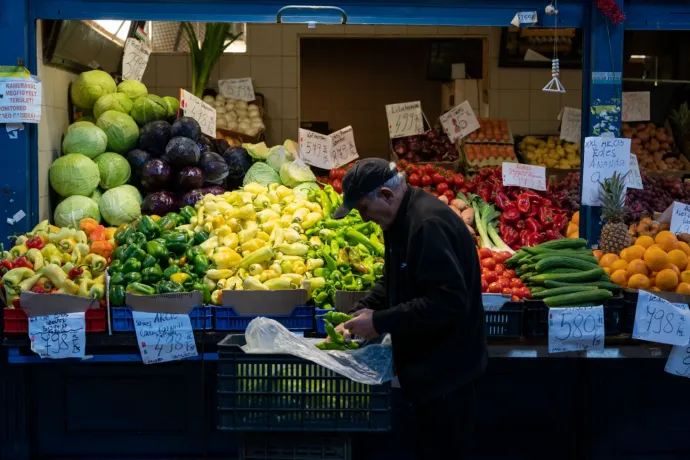
The rate of inflation in Hungary was 25.4 percent in February, according to the latest information from the Hungarian Central Statistical Office (KSH). Many awaited the February figure eagerly because several sources had previously communicated that the January inflation rate of 25.7 percent might be the record, and that a decline would follow from there. As in previous months, food and household energy were the most expensive items.
It's been with us for a year and a half, and everyone is waiting for it to end – politicians blame each other, Brussels and Moscow for the highest inflation in decades, but all people are interested in is when it will all end. And the promises from all sides are that even though it won't come to a complete end, it will at least return to some sort of a normal pattern in the coming months.
There have been signs pointing to this since the beginning of the year: statistics show that household energy prices have been dropping since their peak in November, and the increase of food inflation has also slowed down from December to January. There are also signs of similar trends in everyday life, for example with both Aldi and Lidl substantially reducing the price of butter and later other dairy products in February.
It's another matter that many have the impression that chains are reducing the price of some products by making others more expensive. For example, many people have recently noticed that fruit and vegetables have become brutally expensive. A Telex reader recently shocked our editorial team by sending a photo of a fruit salad from Spar being sold at 16 400 HUF (43 euros) per kilo.
The latest figures from the Hungarian Central Statistical Office also show a moderation: compared to February of last year, inflation was 25.4%, slightly lower than the month before. The breakdown reveals that compared with February 2022, food prices rose by 43.3 percent in February 2023, with the most significant increase recorded for eggs (79.2 percent), dairy products (76.2 percent) and butter and cream cheese (75.1 percent), cheese (72.1 percent), bread (71.1 percent), flour and confectionery (68.6 percent), dry pasta (57.3 percent), milk (53.7 percent) and pastries (51.9 percent). Flour (up 9.8 percent) and cooking oil (up 3.4 percent) increased the least.
The cost of household energy rose by 49 percent. More specifically, the price of piped gas increased by 78.4%, firewood by 59.5%, bottled gas went up by 52.0% and electricity by 27.6%.
Even those making good money on it would prefer to overcome it
Over the last six months, tackling inflation has become a key issue in Hungarian politics. According to the government, the war in Ukraine is primarily to blame for the rise in prices, while the second reason is the sanctions imposed on Russia by Brussels in response. In his annual State of the Nation speech, Prime Minister Viktor Orbán compared inflation to a tiger and set the goal of bringing it down to single digits by the end of the year.
But there is another side to the issue, and that is the rising tax revenues due to inflation. AT 27%, the Hungarian VAT rate is considered a world record, while inflation above 25% is an EU record. This means that with such high inflation and such a high VAT rate, the state's VAT revenue increases significantly, which is no small help to the state budget.
Last year, this meant that instead of the planned HUF 5,487 billion, HUF 6,860 billion of VAT went into the budget, a difference of 25 percent compared to the planned amount. This is good for the state, of course, as its expenditure is not growing as fast, but it is a huge burden for the people (and especially the poor, who use up most of their income immediately).
Many countries have responded to the increasing burden on their populations by reducing sales taxes. Spain, for example has made bread, milk, cheese, eggs, fruit and vegetables VAT-free. Hungary has had no such measures, but introduced price caps instead, which the government claims will reduce inflation, while critical economists and the MNB (Hungary's Central Bank) say will brutally increase it.
Inflation has already been on the decline in most European countries in recent months, as global energy prices are on the way down, and this will eventually filter through to Hungary. So the brutal price hikes will at some point come to an end, but the question is when and how quickly.
For more quick, accurate and impartial news from and about Hungary, subscribe to the Telex English newsletter!
And since you're here, we invite you to be a part of shaping Telex English! Take a few minutes to fill out our anonymous survey, and tell us what you think about Telex English and how it could be even better!